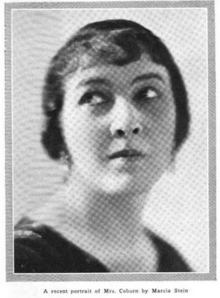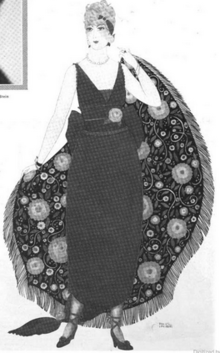Ivah Wills Coburn
Ivah Mae Wills Coburn (August 19, 1878[1][2] – April 27, 1937) was an American actress and Broadway producer.

Early life
Ivah Wills was from Appleton City, Missouri, the daughter of George Browning Wills and Anna Kunz Wills.[3] She was raised in Brookston, Indiana.[4] She studied drama at the Chicago Musical College.[5]
Career

She began her acting career in touring companies run by E. H. Sothern and Amelia Bingham.[5] Ivah Wills Coburn's Broadway performing and producing credits included The Yellow Jacket (1916), The Imaginary Invalid (1917), The Better 'Ole (1918-1919), Three Showers (1920), French Leave (1920),[6] The Bronx Express (1922), The Farmer's Wife (1924-1925), The Right Age to Marry (1926), The Yellow Jacket (1928-1929), Falstaff (1928-1929), The Plutocrat (1930),[7] and Troilus and Cressida (1932).
Coburn and her husband had a touring repertory company that presented Shakespeare, French and Greek dramas and comedies at college campuses throughout the United States.[8] They directed the Mohawk Drama Festival in Schenectady, New York in 1935 and 1936.[5]
Personal life
Ivah Wills met Charles Coburn when he was playing Orlando to her Rosalind in As You Like It. They married in 1906, in Baltimore.[9] She died in 1937, at Lenox Hill, from "intestinal influenza". Among the honorary pallbearers at her funeral were George M. Cohan, Theodore E. Steinway, Walter Hampden, Dixon Ryan Fox, Augustin Duncan, and Edgar Lee Masters.[10] After her death, Charles Coburn left the stage and found success in films, winning the Academy Award for Best Supporting Actor in 1944, for The More the Merrier.[11]
References
- U.S. Passport Applications, 1795-1925
- Birthdate listed as August 1878; 1900 United States Federal Census
- "Mrs. Coburn, Famed Stage Actress, Called by Death" Los Angeles Times (April 28, 1937): 7.
- "Romantic Stage Career of Mr. and Mrs. Coburn" Boston Daily Globe (February 18, 1934): 43.
- "Mrs. C. D. Coburn, Actress, is Dead" New York Times (April 28, 1937): 28.
- "Mrs. Coburn, in 'French Leave', is Brilliantly Clothed by Paul Iribe" La France (November 1920): 77.
- "'The Plutocrat' Seen as Comic Strip Play" New York Times (February 21, 1930): 26.
- "Mrs. Ivah Coburn, Known for College Drama Tours, is Dead" Chicago Daily Tribune (April 28, 1937): 14.
- "'Strip' Acts Less Harmful to Morals than Censorship" Boston Daily Globe (February 25, 1934): 42.
- "Hundreds at Services for Mrs. I. W. Coburn" New York Times (April 30, 1937): 21.
- "Actor Charles Coburn, 84, Dies After Minor Surgery" Janesville Daily Gazette (August 31, 1961): 24. via Newspapers.com
